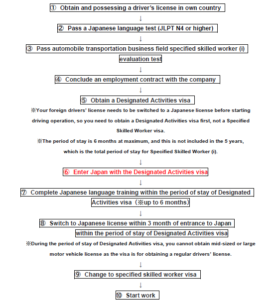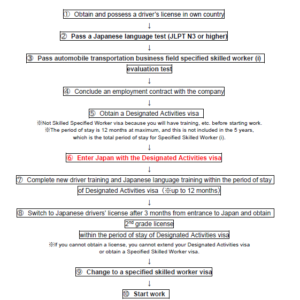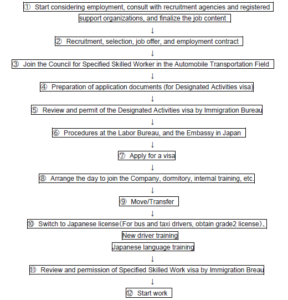Specified Skilled Worker/Technical Intern Training Visa
Visa for foreign drivers~Specified Skilled Worker (i)~
- 2025.04.23

Due to an increase in foreign tourists and the aging of current drivers, there is a chronic shortage of taxi and bus drivers. Plus, in April 2024, a cap was placed on overtime work for truck drivers, resulting in a shortage of truck drivers. In order to solve these problems, following a cabinet decision in 2024, it became possible to accept foreigners in the automobile transportation business (drivers, etc.) with the Specified Skilled Worker visa from December of the same year. As a result, in February 2025, the first foreign bus driver appeared in Japan under the visa. In this column, we will see what has changed with the addition of the automobile transportation business to the industries subject to Specified Skilled Worker Visa, and how you can obtain a Specified Skilled Worker Visa.
What is Specified Skilled Worker Visa?
The purpose and history of the Specified Skilled Worker system
Aside from the driver’s industry…
In Japan, there is a labor shortage in the field of agriculture, nursing care, etc. There are only few people in Japan who are interested in those fields due to the low birth rate, aging population, depopulation, etc., but there are foreigners who would say,
“I’ve worked in the agriculture field in my country, so I want to work in a farm in Japan!”
“I want to work in the nursing care industry and gain a skill!”
However, foreigners need some kind of visa to work in Japan.
So let’s see what kind of visas are available in such cases.
First, the most common work visa “Engineer/Specialist in Humanities/International Services” is for white-collar occupations and does not cover on-site work including the above work types.
There is also a visa called “Designated Activities No. 46” that allows certain on-site work such as nursing care, but it requires a graduation from a Japanese university or graduate school, and the work must contain communication in Japanese, so the hurdles are high.
Therefore, unless you have a spouse visa or other visa with no restrictions on the type of work, it is difficult for foreigners to perform on-site work like the above. Therefore, even if there are foreigners who would like to work in fields with labor shortages, it did not lead to resolve the labor shortage.
Therefore, in 2019, the system of Specified Skilled Worker was launched, making it possible to employ foreigners in 12 non-white-collar field (including “nursing care” and “agriculture”). The Specified Skilled Worker visa does not require any educational background, unlike the Designated Activities No. 46.
As such, since the Specified Skilled Worker visa is aimed at resolving labor shortages, new fields have been added in accordance with the situation of each time. And in the Cabinet decision on March 29, 2024, four new fields of labor shortages, “automobile transportation business,” “railway,” “forestry,” and “lumber industry,” were added, bringing the number of target industries to 16.
This “automobile transportation business” includes truck, bus, and taxi drivers, which are the subject of this article.
For details on the target industries and additional industries for the Specified Skilled Worker Visa, please see this blog.
Types of Specified Skilled Worker visa ((i)&(ii))
As mentioned above, the Specified Skilled Worker visa is aimed to alleviate labor shortages, and does not have any educational requirements. However, since it is a visa for the purpose of employment, it is assumed that the applicants already have a certain level of skills.
Depending on the field and work that requires a certain level of skill, it is divided into “Specified Skilled Worker (i)” and “Specified Skilled Worker (ii)”.
|
Specified Skilled Worker (i) |
Activities to engage in duties that require skills for which a considerable degree of knowledge or experience |
|
Specified Skilled Worker (ii) |
Activities to engage in duties that require expert skills |
(See the section on specific skilled workers in Appendix 1-2 of the Immigration Control and Refugee Recognition Act (hereinafter referred to as the “Immigration Act“))
Outline of Specified Skilled Worker (i) (*Automobile transportation business is included in Specified Skilled Worker (i) only)
As mentioned above, Specified Skilled Worker (i) requires “skills for which a considerable degree of knowledge or experience,” while Specified Skilled Worker (ii) requires more advanced skills, that is “expert skills.” Due to these differences, Specified Skilled Worker (ii) is given preferential treatment.
Since the automobile transportation business only subjects to Specified Skilled Worker (ii), we will explain Specified Skilled Worker (i) here. (Please see here for the differences between Specified Skilled Worker (i) and (ii), requirements common to all fields, application process, etc.)
【Overview of Specified Skilled Worker (i)】
|
Period of stay |
4 months ・ 6 months ・ 1 year (Up to 5 years in total) *Note: Calculation of the total 5 years: Calculate the period from the date of receipt of the residence card, not from the date of employment. *Note: If you have stayed in Japan in the past under Specified Skilled Worker (i), the period of stay from the past residence must be added when calculating the total of 5 years. |
|
Obtaining Permanent residency |
Not applicable (required to change to Specified Skilled Worker (ii)) |
|
Accompanied by family members |
Basically not permitted |
|
Japanese language level |
Confirm thorough examination, etc. (excepted if the applicant has completed technical intern training (ii) with good results) |
|
Skill standards |
Confirm thorough examination, etc. (excepted if the applicant has completed technical intern training (ii) with good results) |
|
Preparation and implementation of a support plan by accepting organization |
Required |
|
Field |
Nursing Care, Building Cleaning Management, Manufacture of Industrial Products, Construction Industry, Shipbuilding and Ship Machinery Industry, Automobile Repair and Maintenance, Aviation Industry, Accommodation Industry, Automobile Transportation Business, Fishery and Aquaculture Industries, Manufacture of Food and Beverages, Food Service Industry, Automobile Transportation Business, Railway, Forestry, Wood Industry (16 fields) |
What are field-specific operational policies?
So far, we have looked at matters common to all fields of Specified Skilled Worker, but the scope of Specified Skilled Worker is wide, covering 16 fields, and the labor shortage situation and necessary human resources differ from field to field. Therefore, the details of each field are set out in the “field-specific operational policies” prepared by the Minister of Justice in collaboration with the heads of each relevant administrative agency, the National Public Safety Commission, the Minister of Foreign Affairs, and the Minister of Health, Labor and Welfare (see Article 2-4, paragraph 1 of the Immigration Control Act).
In addition, the field-specific operational policies are required to set out the following matters.
- The industrial fields, which need to secure human resources to supplement the labor shortage through the employment of foreign nationals due to the difficulty in securing human resources, to be specified in the field-specific operation policy;
- The particulars on the situation of the shortage of human resources in the industrial fields under the preceding item…;
- The particulars on the criteria for the human resources required in the industrial fields of item (i);
- The particulars on the measures for suspension of issuance of the certificates of eligibility or the measures for recommencement of issuance … in the industrial fields of item (i);
- In addition to those particulars set forth in each of the preceding items, important particulars on operation of the system pertaining to the “Specified Skilled Worker” status of residence in the industrial fields of item (i).
(Reference: Article 2-4, paragraph 2 of the Immigration Control Act)
As mentioned above, for the Specified Skilled Worker visa, the detailed requirements for the applicant’s side and the detailed requirements for the receiving organization’s side are set out in the field-specific operational policy of each field.
For the automobile transportation business (drivers, etc.), there is a field-specific operational policy called the “Policy on the Operation of the System Related to the Status of Residence of Specified Skilled Worker in the Automobile Transportation Business Field” (hereinafter referred to as the “Automobile Transportation Business Operational Policy“). So, let’s take a look at the automobile transportation business field, focusing on the Automobile Transportation Business Operational Policy.
Specified Skilled Worker: Overview of the automobile transportation business
So far, we have looked at the points common to all Specified Skilled Worker fields. From here, we will look at the matters that are specifically stipulated for the automobile transportation business.
Business classification
The Automobile Transportation Business Operational Policy stipulates the following for Specified Skilled Worker in the automobile transportation business.
① Driving a commercial vehicle (truck) and general work associated with driving
② Driving a commercial vehicle (taxi) and general work associated with driving
③ Driving a commercial vehicle (bus) and general work associated with driving
As you can see, foreigners are allowed to work as drivers. However, there are various associated tasks besides driving that need to be performed by drivers, and it would be inconvenient if drivers could only drive. Therefore;
“It is acceptable to engage in related work that would normally be performed by Japanese nationals engaged in the said work (e.g. vehicle cleaning, and work for which expertise is not confirmed by examination, etc.) incidentally.”
Reference:
Employment type
According to the operational policy for the automobile transportation business, direct employment is the only option.
In other words, the host company and the foreign national must enter into a direct employment contract, and dispatched or contracted employees are not eligible.
Human resource standards
In addition to the general requirements for Specified Skilled Worker, the following requirements are added for the automobile transportation business.
References:
“Policy on the Operation of the System Related to the Status of Residence of Specified Skilled Worker in the Automobile Transportation Business Field”, “Operational Guidelines for the Policy on the Operation of the System Related to the Status of Residence of Specified Skills in the Automobile Transport Industry”
etc.
Truck driver
|
Additional requirements |
Notes |
|
Passing automobile transportation business field specified skilled worker (i) evaluation test (truck) |
– Contents of the test: This test verifies that you are at a level where you can carry out pre- and post-operation inspections, safe operation, keep driving records, and load cargo without causing cargo shift under the guidance and supervision of the operation manager, etc. |
|
Obtaining a 1st grade Driver’s License. |
– This is a license to drive a car or a motorbike, also known as a “regular motor vehicle license.” – You can drive trucks with a total vehicle weight of less than 3.5 tons, a maximum load capacity of less than 2 tons, and a passenger capacity of 10 people or less (for licenses obtained in 2017 or later). |
|
Passing a Japanese language test |
– JFT Basic, JLPT (N4 or higher), or a test that is equivalent to or higher than J.TEST A2 – Those who have completed technical intern training (ii) with a good result will be exempt from the Japanese language test. |
Taxi driver
|
Additional requirements |
Notes |
|
Passing automobile transportation business field specified skilled worker (i) evaluation test (taxi) |
– Contents of the test: This test verifies that you are at a level where you can carry out pre- and post-operation inspections, drive safely, create driving records, and deal with passengers under the guidance and supervision of the operation manager in the general passenger automobile transportation business, and includes content that conforms to the written test for the 2nd grade driver’s license. |
|
Obtaining a 2nd grade Driver’s License |
– This license is required for commercial passenger transport, such as buses, taxis, hire cars, and driving agencies. |
|
Passing a Japanese language test |
– JLPT (N3 or higher), or a test that is equivalent to or higher than J.TEST B1. – Unlike the truck transport business, a higher level of Japanese language proficiency is required, as explanations to customers and emergency responses in case of an accident, etc. are required. |
|
Completion of new driver training |
– Road haulage operators are required to instruct and supervise drivers of commercial automobiles, and as part of this, new driver training is required (see Article 38, paragraphs 1, 2, 5, and Article 39 of the Passenger Automobile Transport Business Transportation Regulations). |
Bus driver
|
Additional requirements |
Notes |
|
Passing automobile transportation business field specified skilled worker (i) evaluation test (bus) |
– Content of the test: This test verifies that you are at a level where you can carry out pre- and post-operation inspections, drive safely, create driving records, and deal with passengers in general passenger vehicle transportation business, general chartered passenger vehicle transportation business, and specific passenger vehicle transportation business under the guidance and supervision of the operation manager, and includes content that conforms to the written test for the 2nd grade driver’s license. |
|
Obtaining a 2nd grade Driver’s License |
– This license is required for commercial passenger transport, such as buses, taxis, hire cars, and driving agencies |
|
Passing a Japanese language test |
– JLPT (N3 or higher), or a level equivalent to or higher than the J. TEST B1. – Unlike the truck transport business, a higher level of Japanese language proficiency is required, as explanations to customers and emergency responses in case of an accident, etc. are required. |
|
Completion of new driver training |
– Road haulage operators are required to instruct and supervise drivers of commercial automobiles, and as part of this, new driver training is required (see Article 38, paragraphs 1, 2, 5, and Article 39 of the Passenger Automobile Transport Business Transportation Regulations). |
Additional requirements for organizations of affiliation of the specified skilled worker
The Specified Skilled Worker visa imposes various requirements not only on the applicants but also on the organizations that accept foreigners under the Specified Skilled Worker visa. These organizations are called organization of affiliation of the specified skilled worker.
Here, we will omit the requirements for organizations of affiliation of the specified skilled worker that are common to all fields, and focus on the requirements that are particularly imposed in the case of the automobile transportation business.
(For general requirements for organization of affiliation of the specified skilled worker (common to all fields), please see this blog )
The Automobile Transportation Business Operational Policy stipulates the following as “conditions particularly imposed on organization of affiliation of the specified skilled worker.”
- Become a member of the “Automobile Transportation Field Specified Skilled Worker Council” established by the Ministry of Land, Infrastructure, Transport and Tourism;
- Provide necessary cooperation to the council;
- Provide necessary cooperation with surveys or guidance conducted by the Ministry of Land, Infrastructure, Transport and Tourism or those commissioned by it;
- Be an operator of an automobile transportation business (including Type 2 freight forwarding business) as stipulated in Article 2, paragraph 2 of the Road Transport Act;
- Be certified under the Driver Workplace Environment Quality Certification System implemented by Class NK General Incorporated Foundation, or have a safety-oriented business establishment recognized by the National Trucking Optimization Project Implementation Organization;
- For organizations of affiliation of the specified skilled worker in the taxi and bus transport industries, provide new driver training to foreigners they plan to accept with Specified Skilled Worker (i) residence status; and
- When entrusting a registered support organization with the implementation of a support plan for Specified Skilled Worker (1), Entrust to a registered support organization that is a member of the council and provides necessary cooperation to the Ministry of Land, Infrastructure, Transport and Tourism and the council.
The process leading up to starting driving work (if you live overseas)
Finally, we will explain the general process for a case where a foreigner enters Japan and works as a driver.
Process on the foreigner’s side
Truck driver

(Refer to Ministry of Land, Infrastructure, Transport and Tourism “Specific Skills Q&A” https://www.mlit.go.jp/jidosha/content/001846438.pdf)
Taxi/bus driver

(Refer to Ministry of Land, Infrastructure, Transport and Tourism “Specific Skills Q&A”
https://www.mlit.go.jp/jidosha/content/001846438.pdf)
Process on the company’s side (truck, taxi, bus)

Reference: All Japan Trucking Association’s “Guide to accepting specified skilled workers in the truck category of the automobile transportation field”
Summary
The automobile transport industry has enriched the lives of people in Japan, but unfortunately, there is a shortage of drivers due to the declining birthrate and aging population. In the midst of the declining birthrate and aging population, the employment of women and the elderly is encouraged, but this is difficult in the automobile transport industry, so foreign drivers are expected to play an active role.
If you wish to become a driver in Japan, why not consider a Specified Skilled Worker visa?
The Specified Skilled Worker visa has complicated requirements, such as general requirements and requirements by field. If you are a foreigner who is not sure whether you are eligible for a Specified Skilled Worker visa, or if you are a company that is interested in accepting Specified Skilled Worker foreigners, please feel free to contact us.
We are Yanagi group, which have offices in Osaka (Abeno and Tennoji), and our affiliated offices in Tokyo (Shibuya and Ebisu) are also available for an on-site consultation. We have handled many applications for permanent residence permits, naturalization permits, work visas, college student visas, management visas, etc., as well as visa renewal procedures related to the status of residence with the Immigration Bureau (Immigration Bureau) as a one-stop service. Our experienced administrative scriveners are also available to help you with any problems you may have.
We also have staff members who can speak each of the native languages and can assist you in obtaining a visa.
※If you wish to be consulted in Nepali or Bengali, please inform us in advance via our website or social media, and the translator will contact you ahead of time.
Please feel free to contact us if you have any questions about your status of residence or visa, even if they are trivial.
Toll free number: 0120-138-552
For English speaker: 080-9346-2991
For Chinese speaker: 090-8456-6196
Editor of this article

- Ryota Yanagimoto
- Administrative Scrivener/Judicial Scrivener
At the age of 24, he passed the national examinations for judicial scrivener, administrative scrivener, and wage service manager at the same time.
While working as a full-time lecturer at a major prep school, he independently opened a legal office related to judicial scriveners and administrative scriveners,
and he has experience as a judicial scrivener and an administrative scrivener for more than 15 years so far.
He has been actively contributing to various industries such as publicly listed companies, real estate companies, financial institutions, elderly care services, and professional organizations by conducting seminars, lectures, and talks.
And now he has a record of over 60 presentations so far.
Furthermore, as the president of a Japanese language school announced by the Ministry of Justice and Acts, and an advisor to a real estate company (capable of handling foreign clients),
he has been involved in various aspects of industries related to foreigners.
It is recommended to consult with experts when it comes to visas, naturalization, and residency matters.

Our office has specialized experts in visa and naturalization applications who are available to assist with free consultations (limited to the first session) and inquiries related to various visa applications and naturalization applications.
Additionally, we have foreign staff proficient in English, Chinese, and Korean languages with specialized knowledge, and they are present to provide support. They can accommodate consultations and inquiries in each language. Feel free to use our free consultation and inquiry services from here.























 0120-138-552
0120-138-552 Free
Consultation
Free
Consultation Contact Us
Contact Us